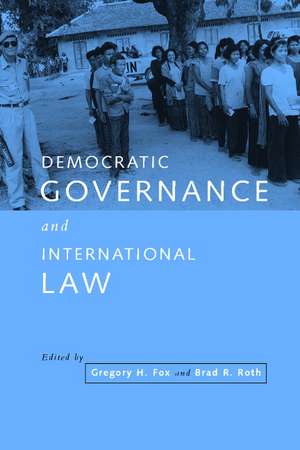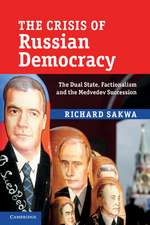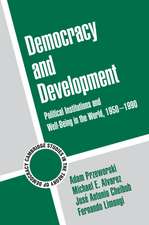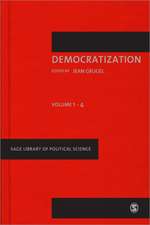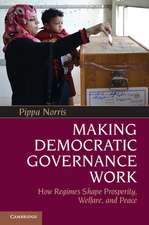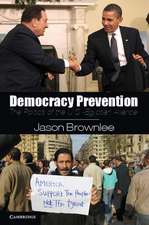Democratic Governance and International Law
Editat de Gregory H. Fox, Brad R. Rothen Limba Engleză Paperback – 10 mai 2000
| Toate formatele și edițiile | Preț | Express |
|---|---|---|
| Paperback (1) | 439.77 lei 6-8 săpt. | |
| Cambridge University Press – 10 mai 2000 | 439.77 lei 6-8 săpt. | |
| Hardback (1) | 1014.83 lei 6-8 săpt. | |
| Cambridge University Press – 10 mai 2000 | 1014.83 lei 6-8 săpt. |
Preț: 439.77 lei
Nou
Puncte Express: 660
Preț estimativ în valută:
84.16€ • 87.54$ • 69.48£
84.16€ • 87.54$ • 69.48£
Carte tipărită la comandă
Livrare economică 15-29 aprilie
Preluare comenzi: 021 569.72.76
Specificații
ISBN-13: 9780521667968
ISBN-10: 0521667968
Pagini: 600
Ilustrații: 1 b/w illus. 1 table
Dimensiuni: 153 x 229 x 37 mm
Greutate: 0.93 kg
Ediția:New.
Editura: Cambridge University Press
Colecția Cambridge University Press
Locul publicării:Cambridge, United Kingdom
ISBN-10: 0521667968
Pagini: 600
Ilustrații: 1 b/w illus. 1 table
Dimensiuni: 153 x 229 x 37 mm
Greutate: 0.93 kg
Ediția:New.
Editura: Cambridge University Press
Colecția Cambridge University Press
Locul publicării:Cambridge, United Kingdom
Cuprins
Introduction: The spread of liberal democracy and its implication for international law Gregory H. Fox and Brad R. Roth; Part I. The Normative Foundations of a Right to Political Participation: 1. Legitimacy of the democratic entitlement Thomas M. Franck; 2. The right to political participation in international law Gregory H. Fox; 3. Democracy and the body of international law James Crawford; Part II. Democracy and Inter-State Relations: 4. Democratic legitimacy and the recognition of states and governments Sean D. Murphy; 5. Constitutionalism and democratic government in the inter-American system Steven Schnably; 6. Government networks: the heart of the liberal democratic order Anne-Marie Slaughter; Part III. Democracy and the Use of Force: 7. Sovereignty and human rights in contemporary international law W. Michael Reisman; 8. 'You, the people': pro-democratic intervention in international law Michael Byers and Simon Chesterman; 9. Pro-democratic intervention by invitation David Wippman; 10. The illegality of 'pro-democratic' invasion pacts Brad R. Roth; 11. International law and the 'liberal peace' John Owen; Part IV. Democratisation and Conflicting Imperatives: 12. Intolerant democracies Gregory H. Fox and Georg Nolte; 13. Whose intolerance, which democracy? Martti Koskenniemi; 14. Democratic intolerance: observations on Fox and Nolte Brad R. Roth; 15. A defence of the 'intolerant democracies' thesis Gregory H. Fox and Georg Nolte; 16. Democracy and accountability: the criss-crossing paths of two emerging norms Steven R. Ratner; Part V. Critical Approaches: 17. Evaluating democratic progress Brad R. Roth; 18. What kind of democracy does the 'democratic entitlement' entail? Jan Knippers Black; 19. International law, democracy and the end of history Susan Marks.
Recenzii
'In sum, the collection provides the reader with a host of factual information and a wealth of critical and diverse ideas as to if and how the international legal system Is affected by the 'wave of democratization' following the end of the Cold War. Democratic Governance and International Law proves to be an indispensable reading for everyone interested in the future developments in a broad variety of areas of international law, influenced by the rise of the principle of democratic legitimacy.' Karsten Nowrot, German Yearbook of International Law
Descriere
This book considers how the post-Cold War democratic revolution has affected international law.
